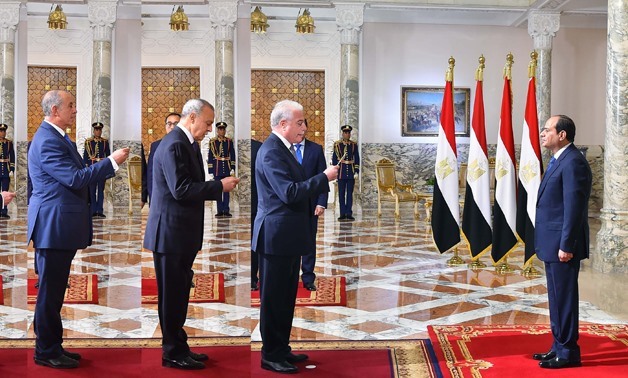
A number of newly-appointed governors were sworn-in before President Abdel Fatah al-Sisi - Press Photo
CAIRO – 1 September 2018: Twenty-seven governors including 21 new ones swore the constitutional oath Thursday before President Abdel Fatah al-Sisi; five governors will remain in their posts, while former Damietta governor Ismail Taha was transferred to the post of Kafr al-Sheikh governor.
Following their appointment political science professor Mostafa Elfeky said to CBC’s “Yahdth fe Masr” (Happening in Egypt) program that a governor's job in Egypt is the most difficult job within the country, explaining that it has “specific validity, unlimited budget and great responsibility.”
He stated that the new governmental law is not issued yet, wondering when this law will see the light. The draft law is expected to be passed during the fourth session of Parliament, which starts early October. According to the new draft law, the governors will be granted full powers, which enable them to perform their duties in an optimum manner, in addition to granting local units an independent budget.
This new law stipulates that the governor represents the executive branch of the government, supervises the implementation of the state policy within the governorate and enforces laws and regulations of governance. The Governor shall be responsible for ethics and public values and for the protection of human rights in the governorate. The Governor shall take all necessary measures to protect the public and private property. The Governor shall monitor and coordinate the work of all public utilities.
Many politicians stated that this new law will reduce corruption at different levels and is expected to produce better results, as it is believed that different governorates need different things; training local leaders will allow them to capitalize on the issues facing their own governorate and find solutions for it.
In line with this, previously, in press statements, Wadhah al-Hamzawi, former governor of Sohag, said, “The governor used to first come forward to the municipal council of his governorate before he could allocate any plots of land for investment purposes, and now he is obliged to present any development plans to the Cabinet during its meeting with the governorates, which takes only four hours.”
Former Minister of Local Development Ahmed Zaky Abdeen said that the former local councils did not have an effective role in contributing to the development of the governorates. “The problem boils down to the lack of experienced and qualified people in these councils,” he added.
“Governors should be more concerned with the investment areas in governorates,” Constitutional Law Professor Salah Fawzi said, stressing that they should make a plan to develop their governorates especially the sport centers to protect youth from political polarization.
The governor also has a security responsibility within the governor, assisted by the security department. He should also adopt the security plan for the governorate, Fawzi added. Moreover, he advised the new governors to set time for a weekly meeting with citizens in order to listen to their complaints and solve them.
Local Administration Committee member Mohamed Attia al-Fayoumi told Egypt Today that governors have a great responsibility waiting for them, pointing out that “the problem of garbage must be resolved quickly, and should be dealt with decisively. …The most important thing that the citizen should be satisfied with the new governors’ performance.”
New governors and deputy governors were sworn-in Thursday before President Sisi.
Among Egypt’s 27 governorates that comprise more than 90 million citizens, the population in some of these governorates exceeds five million citizens each. Seemingly challengeable, all the governorates with such populations have chosen new governors to resume national efforts.
According to the names published by official statements, five governors will remain in their posts, while former Damietta governor Ismail Taha was transferred to the post of Kafr al-Sheikh governor.
Khaled Fouda, governor of South Sinai governorate, Abdel Hamid al-Haggan of Qena, and Ahmed Abdullah of the Red Sea governorate will keep their posts.
Adel al-Ghadban of Port Said, and Mohamed al-Zamlout of the New Valley will also stay in their current posts.
After swearing oath, the newly appointed governors and their deputies met with President Sisi, who ordered them to focus on meeting people’s needs and curbing unaffordable high prices in the local markets, according to a Thursday statement issued by presidential spokesperson Basam Radi.
The governors are set to take post during President Sisi’s second term; according to Egyptian law, the governors' terms end by the end of the Presidential term they were appointed in.
1- Mamdouh el-Sayed for Sharqia
2- Mohamed Shosha for North Sinai
3- Hani Abdel Gaber for Beni Suef
4- Mostafa Alham for Luxor
5- Kamal Gad for Dakahlia
6- Alaa Marzouk for Qalyubia
7- Abdel Aziz Qonswa for Alexandria
8- Ahmed Ebrahim for Aswan
9- Abdel Maguid Ahmed for Suez
10- Hamdi Hamed for Ismailiya
11- Gamal Nour for Assiut
12- Ahmed Rashed for Giza
13- Khaled Abdel Aal for Cairo
14- Essam Saad for Fayoum
15- Magdy al-Gharabli for Marsa Matrouh
16- Saeed Abbas for Menoufia
17- Hisham al-Sayed for Gharbia
18- Hisham Abdel Ghani for Beheira
19- Manal Mikhaeel for Damietta
20- Ahmed al-Ansari for Souhag
Comments
Leave a Comment